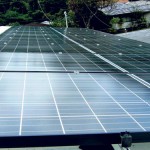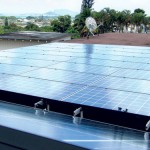How do you choose the right photovoltaic system and contactor for you? What are the differences between different roof racking system components, roof flashings and inverters? If every company says that their modules are the best, how does one know what to look for in quality and long-term energy production? What do the manufacturers’ warranties really provide as protection for future problems?
These questions, as well as others, are common, and Pacific Islands Construction believes that with information, the decision-making process will be a better one.
Pacific Islands Construction is more than just a solar contractor. As a roofing contractor and general contractor, it also knows how your roof is constructed. The company understands how to properly seal the roof penetration made in your roof, protect your home from leaks and keep your roof warranty in place. PV installations require many penetrations through your roof, so caution needs to be taken in this area. The company guarantees your roof will not leak from its installation for a period of seven years, the longest period the state allows a contractor to promise.
Every component of the PV system should be examined, and this also applies to the racking system that secures the solar modules on your roof. It should be heavy-duty and tested to meet high winds. If it is a single fastener that is spaced too far apart, the rail will bow and probably not stay in place during high winds. It is important to see samples of the attachment mechanism to ensure your investment is protected from future problems.
Not all solar modules are equal — in fact, many are experiencing a problem called snail trails. The phenomenon is called that because of its appearance, and it has been reported that modules are under performing. More than 25 manufacturers have had this problem so far. The cause of the problem is not fully understood, but likely factors include micro cracks in cells, cheaper components, weak frames and poor construction. Unfortunately, the manufacturers have not honored the warranties on these products, blaming the damage on shipping and installers, which are not covered in warranties.
Warranties exclude a lot of things, so take the time to read them before you trust them. Many warranties do not cover removal of defective modules or shipping. In the fine print, energy depreciation can also be more than the 20 percent that most manufacturers allude to. Some manufacturers allow up to 3 percent energy lost in the first year. Just remember that the manufacturers are writing these documents to protect themselves.
It is important that you, the consumer, know that most solar manufacturers are losing money and are not profitable. If the production cost to the manufacturers is $1 per watt and they are selling it at 80 cents per watt, they are probably not going to be in business very long.
The description just given is the state of the industry today, and it explains why weekly reports of companies leaving the industry are common.
The largest solar manufacturer in the world by volume, Suntech, has just been told by the New York Stock Exchange that it is going to be delisted since the stock price has fallen below $1. Sharp has announced that it is closing the American production facility and is rumored to be closing or selling its solar division at home to satisfy a $16 billion debt. Unfortunately, it is inevitable that over the next two years, most recently purchased systems will have no one to honor their warranty as the industry is left with only a few manufacturers.
Pacific Islands Construction is a company that tries to protect its customers from the issues faced by using only the best equipment and installation practices. It is offering specials this month on selective systems and can be contacted by calling 841-7756 or visiting pacificislandsconstruction.net.
contact // 841-7756
web // Pacificislandsconstruction.net

